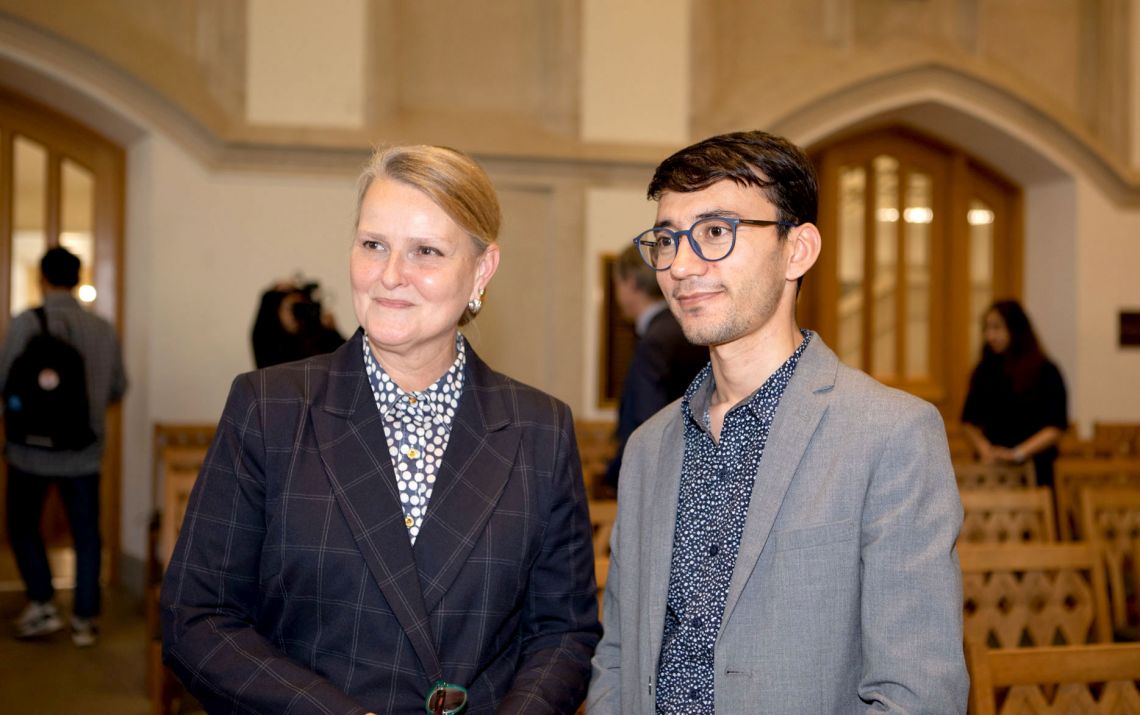
Sebghatullah Jalali didn’t need to hear a lecture on protecting civilians in violent conflicts.
He lived it.
Jalali was airlifted out of his native Afghanistan last year while working as a program officer with the United States Institute of Peace. On Thursday in Goodson Chapel, he took the opportunity to publicly thank the institute’s president, Lise Grande, for its work to advance peace around the world – and save his life.
“When the government collapsed, chaos took place in Kabul and so my colleagues and I were in imminent threat of being captured and, God forbid, killed by the Taliban,” said Jalali, now a research associate at Duke Law.
“At that time I saw an example, a leadership that protects civilians, my colleagues and I first. You showed courage, resilience and empathy, I will not forget that. … You’re an example of protecting civilians in crisis.”
Grande, whose background includes 12 wars and 25 years of overseas experience leading, managing and coordinating complex operations for the United Nations, was the keynote speaker at this year’s Anthony J. Drexel Biddle, Jr. Lecture on International Studies.
“She has one of the hardest jobs in Washington,” said Patrick Duddy, a former U.S. ambassador to Venezuela who now directs Duke’s Center for Latin American and Caribbean Studies.
Congress founded the institute in 1984 as a national, nonpartisan, independent institute, dedicated to the proposition that a world without violent conflict is possible, practical and essential for U.S. and global security.
During the hour-long event, Grande shared insights and experiences on the challenges of getting warring groups to let humanitarian aid reach civilians, including in Iraq, Somalia and Sudan.
“During these 25 years I saw the doctrine and the practice of civilian protection evolve,” she told the roughly 70 people in attendance, which included Biddle’s granddaughter, Mary Duke Trent Jones, who introduced Grande. The practice is now “a central pillar of international engagement and an integral component of military campaigns in conflicts,” Grande said.
The institute works with local partners to prevent, mitigate and resolve violent conflict by linking research, policy, training analysis and direct action to support groups working to stem violence and help civilians in these troubled areas.
One of the limitations, Grande said, is that warring factions have to agree to let UN and related aid groups into their countries. That’s why the institute maintains a nonpartisan stand, and will often appeal to the goodwill at the core of religious traditions in these areas, she said.
Russia’s invasion of Ukraine could drastically upend decades of progress supporting humanitarian efforts in conflict zones, she said.
“We only have to look at Ukraine to realize there will almost certainly be many more situations in the months and years ahead for millions of civilians; lives will be at stake in a kinetic theater of war,” Grande said.
“We are now in a very different place than we expected to be. Russia’s unjust invasion or Ukraine, make no mistake, is a shocking assault on our rules-based international order, an order which they helped create, which brought predictability to international relations during the last 75 years, and an order which created the conditions and institutions which have allow civilian protection to evolve into being a foundational pillar of multinational engagement. This a tremendous achievement.
“It’s not clear what will happen to the rules-based order.”
The future could see more partnerships like NATO, she said, “managed by major and regional powers.”
At home, Grande said the institute also sponsors meetings to get members of Congress to talk across party lines, but participation has dwindled significantly in recent years.
The Biddle Lecture is a bi-annual event organized by the Duke Center for International and Global Studies (DUCIGS) and established by Mary Duke Biddle Trent Semans, James H. Semans, and their family to honor Mrs. Semans' father, Anthony Joseph Drexel Biddle Jr., who had a distinguished career as a United States diplomat and was an original signer of The Duke Endowment. A list of previous speakers can be viewed at Biddle Lecture Speaker Archives.